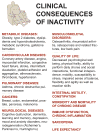The role of exercise and PGC1alpha in inflammation and chronic disease
- PMID: 18650917
- PMCID: PMC2587487
- DOI: 10.1038/nature07206
The role of exercise and PGC1alpha in inflammation and chronic disease
Abstract
Inadequate physical activity is linked to many chronic diseases. But the mechanisms that tie muscle activity to health are unclear. The transcriptional coactivator PGC1alpha has recently been shown to regulate several exercise-associated aspects of muscle function. We propose that this protein controls muscle plasticity, suppresses a broad inflammatory response and mediates the beneficial effects of exercise.
Figures




References
-
- Booth FW, Chakravarthy MV, Gordon SE, Spangenburg EE. Waging war on physical inactivity: using modern molecular ammunition against an ancient enemy. J Appl Physiol. 2002;93(1):3–30. - PubMed
-
- Erikssen G, et al. Changes in physical fitness and changes in mortality. Lancet. 1998;352(9130):759–762. - PubMed
-
- Hu FB, et al. Adiposity as compared with physical activity in predicting mortality among women. N Engl J Med. 2004;351(26):2694–2703. - PubMed
-
- Kokkinos P, et al. Exercise capacity and mortality in black and white men. Circulation. 2008;117(5):614–622. - PubMed
-
- Booth FW, Lees SJ. Fundamental questions about genes, inactivity, and chronic diseases. Physiol Genomics. 2007;28(2):146–157. - PubMed
Publication types
MeSH terms
Substances
Grants and funding
LinkOut - more resources
Full Text Sources
Other Literature Sources
Medical
Miscellaneous

